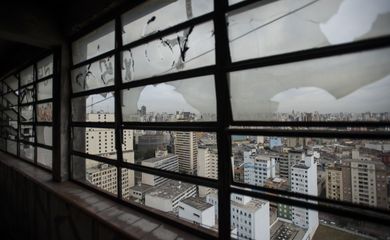São Paulo city has deficit of 230,000 homes


Bird's-eye view of the squatting Douglas Rodrigues, in a 50 thousand m² plot, with 2,620 shacks, in northern São Paulo

With 12 million people, São Paulo faces a housing crisis and has a deficit of 230,000 homes, says the urban planner and United Nations' former special rapporteur on Adequate Housing, Raquel Rolnik. In her view, the situation got worse in the last two years. Due to the lack of housing access, the city sees abandoned lands and buildings being occupied by poor families unable to afford rent payments.
“We are going through a cycle of economic expansion in the city that has increased its income and boosted its real state line of credit. This has resulted on high prices, well above the increase of people's income. This means that land and real state have created a considerable amount of wealth in the city,” stated Raquel Rolnik.

Neighbors from middle-class buildings (background) signed a petition calling for the removal of the squatting
Civil movements in defense of the right to housing estimated that there are 100 land and building squatting throughout the city. In the central zone, where the city council estimates to exist 90 abandoned buildings, we can find flags of several movements, like the Homeless Workers' Movement (MTST), the Housing Struggle Front (FLM) and the Movement of the No-Ceiling in the Center (MSTC), in many deteriorated buildings. In general, these abandoned spaces belong to bankrupt estates or public agencies. There are also cases of owners with tax debts or irregular documentation.
MTST national coordinator Guilherme Boulos endorses that the city has experienced a squatting expansion for the last two years. "From 2013 to now, not only in São Paulo, but in several metropolitan areas of the country, there was a significant increase in squatting, which in my opinion, is directly related to the explosion of property speculation. Land turned into gold in Brazil and the rent payment has become a priceless thing."
Being unable to afford all expenses, especially the monthly rent payment of $118.46, Daniele Araújo Adelino, 17, moved two years ago to a squatting called Douglas Rodrigues, in the north zone of the city. Pregnant with twins at the time, she discovered she had cancer and that the babies would be born with lung problems. The family had to sell the few possessions they had, such as cell phones and bicycle, to buy medicines and special milk for the children. Working as a furniture delivery man, her husband's monthly income of $105.30 was not enough to pay off all debts.
"This place saved our lives. We are happy here. Even when we have nothing to eat, but having [anything] for them [the babies] is all we need," says Daniele.
To Boulos, large property developers are responsible for speculation. These companies abandon land or buildings in order to profit from future public investments in infrastructure in the region. "They act lobbying the government to enable these works to happen. So a land that used to cost R$100.00 ($26.33) per square meter, after these improvement works, its cost jumps past R$300.00 ($79.00)," he stated.
Another aggravating factor is the low investment in the construction of affordable housing. São Paulo city council's target of constructing 55,000 homes by 2016 is far from being achieved. Until June this year, 4,944 units were delivered in 39 projects, according to the Information System for Social Housing in São Paulo (Habisp). There are also 17,140 houses under construction and 31,040 in the phase of design development.

Being unable to afford all expenses, Daniele Araújo Adelino, 17, moved two years ago to Douglas Rodrigues
Given this situation, squatting was the solution found by the ones excluded from the housing market that charges on average $291.29 for renting a two-bedroom apartment of 50 square meters in the center, according to the real estate union (Secovi). Ten years ago, the average rent payment for an apartment like this was $92.67.
"Squatting offers an alternative. Of course that empty buildings, and empty and under-used land help to draw the picture," notes Raquel Rolnik.
As an occupied home does not translate into permanent housing, most of the squattings end up dramatically, very often with violent repossessions accompanied by military police.
By the end of May this year, there were 1,659 repossession requests only in São Paulo.
Translated by Amarílis Anchieta
Fonte: São Paulo city has deficit of 230,000 homes


